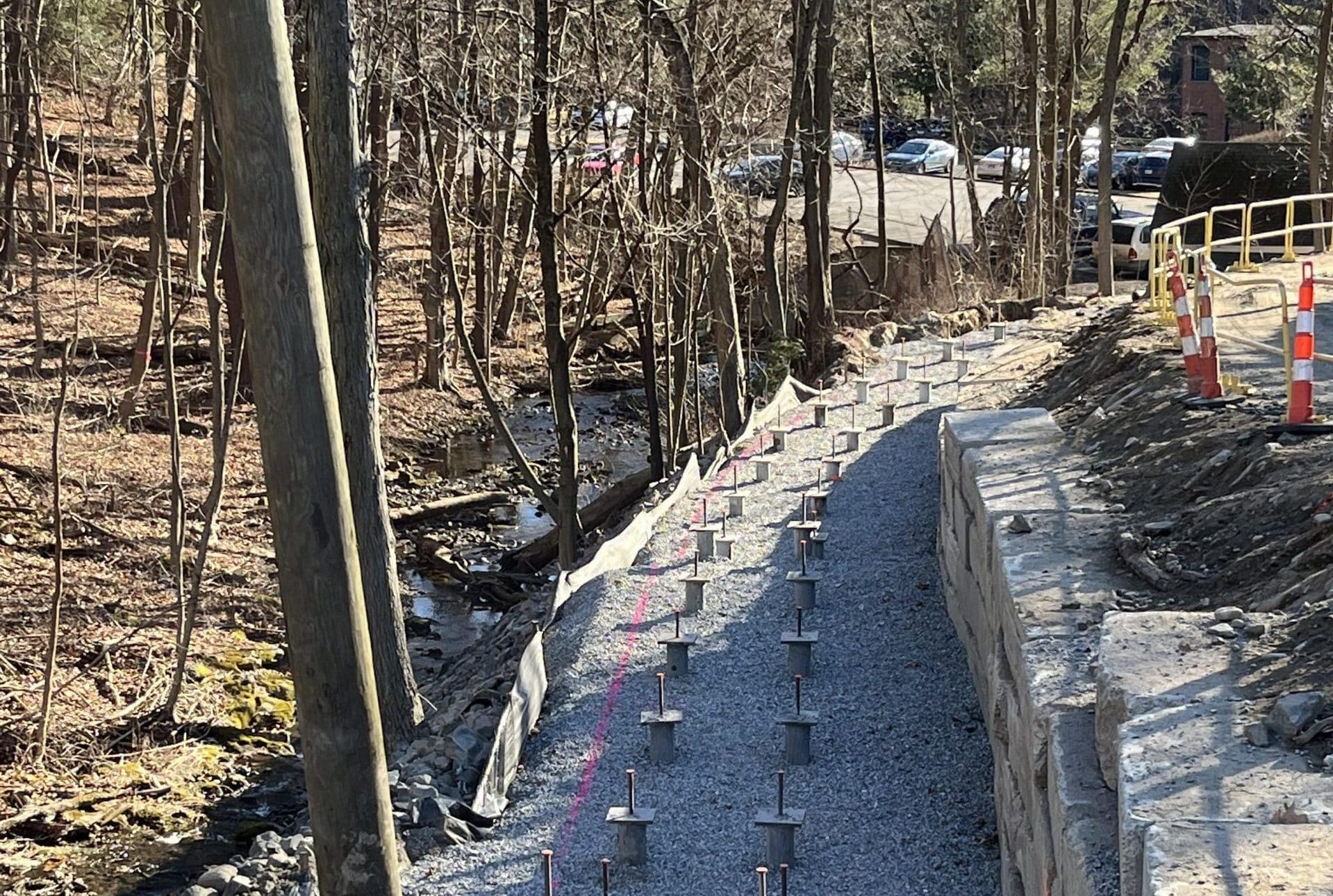Adaptive Drilled Micropile Engineering and Construction Helped Restore Burton Road
Introduction:
This project consisted of replacing an existing retaining wall that supported a 400-foot stretch of Burton Road in Beacon Falls, CT. The wall had reached the end of its service life and was progressively failing, which prompted shut down the roadway and implement a full traffic detour due to public safety concerns.
Geotechnical Challenges:
The project soil borings indicated that the retaining wall was underlain by about 5 feet of fill, over up to about 15 feet of silty sand, overlying relatively dense glacial soils. The project required demolition of the existing wall and construction of a new cast-in-place concrete wall, including a 300-foot segment supported on Drilled Micropiles (DMPs). DMPs were specified to help address geotechnical and logistical concerns. The fill and silty sand layers were unsuitable to support the wall loads due to potential footing settlement and possible slope instability in front of the wall, so the DMPs were required to transfer loads down into the glacial soils. Furthermore, the wall alignment was located below active powerlines, so a low overhead solution was required to maintain a safe, OSHA-compliant clearance. Other possible support methods (such as ground improvement or driven piles) generally require relatively tall masts and were not possible given the presence of the power-lines.
Geotechnical Design/Build Solutions:
Adaptive Drilled Micropile Design Solution:
The public bid documents required a total of 60 DMPs, including 30 battered piles to help resist lateral loads. The original pile design included a relatively low-grade steel and a 8.625-inch casing diameter. For final design, HELICAL’s in-house design team worked closely with the project team to redesign the pile scheme using smaller diameter, higher strength, and more readily available steel casing. In addition, the battered piles were replaced 1:1 with vertical piles given the higher steel strength, which resulted in enhanced lateral load resistance. The redesign was quickly approved by the design team and offered the following primary advantages:
- Designing with a more readily available casing helped cut down material lead time by about 4-6 weeks, so the repair work could begin sooner and help advance final project delivery.
- Converting the 30 battered piles to vertical piles (while still adequately resisting lateral load demands) drastically reduced the amount of earthwork required to provide safe access for pile installation. The reduced earthwork significantly minimized impacts to the existing roadway and utilities.
Adaptive Drilled Micropile Testing and Construction:
HELICAL mobilized to the site and installed a sacrificial test pile, which was designed to include a 12-foot-long bond length in the glacial soils at an allowable bond strength value of 25 psi. During test pile installation, bedrock was unexpectedly encountered at the tip of the pile and reduced the installed bond length to 11.5 feet. We performed a tension test to avoid any end-bearing contributions in the bedrock, and we increased the ultimate test load from 200% to 250% design load to help evaluate whether the actual bond strength within the glacial soils was higher than what was assumed for design. The testing results verified an increased allowable bond strength (from 25 psi to 35 psi) within the glacial soils.
During installation of the first production pile, very shallow bedrock was encountered. The rock was so shallow in fact, that the glacial soil layer was not thick enough to provide the minimum required bond length (even with the higher 35 psi bond stress). So, we quickly adapted our drilling methods for rock rather than soil while our in-house design team simultaneously modified the design to include a 5-foot rock socket. The redesign and approval was completed within about one day due to excellent communication by the project team, CTDOT, and the General Contractor (Dayton Construction Company). As a result, there was no lost time and DMP installation continued without delay.
Production DMP installation, including 48 piles that included rock sockets, was completed on schedule in less than a month. Adaptive design from our in-house engineers, combined with a flexible construction approach and tremendous partnership with the project team helped keep a challenging project with unanticipated conditions on-track such that CTDOT could reopen the roadway as soon as possible.
